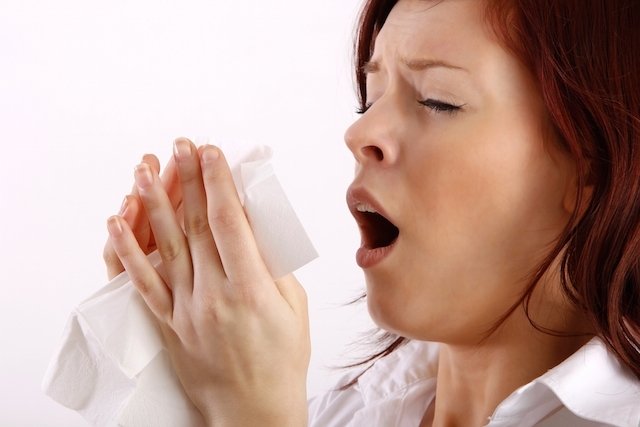To stop sneezing quickly, you can wash your face and clean your nostrils with a few drops of saline solution. This methods can help eliminate dust or ay other triggers that may be inside or around your nose, which can relieve sneezing and discomfort.
Normally constant sneezing and sneezing attacks are stimulated by allergens, and therefore, people with a history of asthma or rhinitis or more prone to sneezing attacks. These may be accompanied by a runny nose and watery or itchy eyes.
Frequent sneezing accompanied by blood or mucus should be assessed by a pulmonologist or allergist for assessment and treatment as appropriate.

Tips to stop sneezing
Some other strategies to stop sneezing are:
1. Bite your tongue
A very effective strategy is to focus your attention on biting your tongue when you feel the urge to sneeze. This is a great strategy for sneezing during awkward moments, like a job interview or an important meeting.
2. Keep the environment clean
People who suffer from some type of allergy are more likely to have respiratory allergies. If this is your case, you should sleep, work and study in properly clean places, free from dust, dust mites and food debris.
Cleaning your room daily and changing the bed linen weekly are great strategies for keeping your bedroom allergen-free. You are also advised to clean your furniture with a damp cloth to remove as much dust as possible.
3. Rinse inside the nose
When facing a sneezing attack, washing your face can help. You may have even more results, however, by applying a few drops of saline solution or sea water into your nostrils. This can eliminate any microorganisms that are causing an allergic reaction.
4. Drink water
Drinking 1 glass of water is also a good way to control sneezing because it stimulates other parts of the brain and moistens the throat. Ensuring adequate fluid intake also helps to keep the airways hydrated and clean.
5. Take a shower
Taking a warm steam bath is also a good strategy to stop sneezing quickly. If drawing a bath is not possible, you can boil some water in a pot and inhale the water vapor that comes out of the pot.
Also recommended: 11 Natural Ways to Clear a Stuffy Nose tuasaude.com/en/stuffy-nose6. Take allergy medicine
For cases of asthma or allergic rhinitis, the lung or allergy specialist or allergist may prescribe specific medications to help manage sneezing and other allergies, like bronchodilators, corticosteroids, salbutamol, budesonide, theophylline and mometasone. These are typically indicated for symptom management and to improve quality of life.
In these cases, medications are used on a daily basis for life. They can help to reduce secretions, facilitate optimal air entry and reduce the chronic inflammation in the airways.
What causes constant sneezing?
The main cause of constant sneezing is allergic reactions that can affect anyone, but especially affect people with asthma or rhinitis. Some factors that can trigger a sneezing attack are:
- Dust in the place, even though it appears clean
- Smell of perfume in the air
- Pepper in the air
- Smell flowers
- Flu or cold
- Being in a closed environment, with little air renewal
Foul-smelling sneezes may be a sign of nasal infection or sinusitis. These conditions are characterized by the accumulation of microorganisms within the airways and can lead to additional symptoms, such as a headache, facial pressure or bad breath.
Why you shouldn't hold in a sneeze
Sneezing is an involuntary reaction of the body that serves to clear the airways of any irritating microorganisms. When trying to hold back a sneeze, the force exerted can lead to the rupture of small blood vessels in the eyes, a perforated eardrum, problems with the diaphragm and tearing of the throat muscles. These are serious conditions that may require urgent surgical intervention.
It is most common to just sneeze between one and three times. However, more than 3 consecutive sneezes may be a sign of an allergy flare-up.
When to see a doctor
You should consult an allergy or lung specialist if you have the following symptoms:
- Constant sneezing without a flu or cold;
- Waking up and having a sneezing attack more than once a week.
A bloody sneeze can be caused by the rupture of small blood vessels inside the nose, and therefore, if your sneezes are accompanied by blood from the nose or in the phlegm with a cough, you should see a doctor for further assessment.
